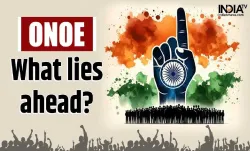One Nation, One Election: What's the road ahead for bill to become an act? EXPLAINED
The One Nation, One Election Bill was introduced in the Lok Sabha on Tuesday. The Bill will be sent to the JPC for further deliberations before it is debated in either house of the Parliament.

The 129th Constitutional Amendment Bill for the simultaneous elections was introduced in the Lok Sabha on Tuesday. After fierce debate and voting on the motion of introduction, the One Nation, One Election Bill was introduced. However, this does not end the tussle between the treasury and the opposition bench over the issue. The bill will have to pass through multiple stages and will have to stand the tests in both Lok Sabha and Rajya Sabha
Where does the bill stand currently?After the One Nation, One Election Bill was introduced in the Lok Sabha, the opposition demanded to send it to the Joint Parliamentary Committee (JPC). Meanwhile, the government has also endorsed the demand stating that discussions at all levels are necessary. Therefore, the bill would be sent to the JPC.
The opposition has termed the bill as an assault on the basic structure of the Constitution. The bill provisions the dissolving of the state assemblies after a president's notification on the first sitting of the Lok Sabha after the general elections. The opposition is protesting it and saying that the state tenure can't be altered unilaterally and thus the bill is essentially against federalism which is the feature of the basic structure of the Constitution.
What lies ahead?JPC working
- The bill will now be referred to the JPC and the JPC would be constituted by drawing members of both the houses.
- The JPC will hold deliberations followed by consultations with the public and meetings with all stakeholders like Election Commission, etc.
- The committee will table the report in the Lok Sabha.
- In case of revisions based on the recommendations of the JPC, the bill will be reintroduced in the Lok Sabha.
Lok Sabha proceedings
- After the JPC stage, the debate and discussions on the bill will take place in the Lok Sabha.
- In case of no amendments, the bill will directly go for voting.
- In case amendments are proposed, firstly the voting will take place on the amendments and then the final voting on the bill.
- If passed, the bill would be sent to the Rajya Sabha otherwise the bill would fail.
Rajya Sabha proceedings
In Rajya Sabha, the same process would follow
- The discussion and debate will take place over the bill
- In case of no amendments, the bill would be put to voting.
- In case the amendments are suggested, the voting on amendments will take place first and then the bill will be put through a final voting.
- If passed, the bill will go for the President's assent and become law after her signature.
- If rejected, the bill will be returned to Lok Sabha
- If amended, the bill will return to Lok Sabha with amendments.
- In case of return of the bill with or without amendment, the Lok Sabha would be solely entitled to entertain Rajya Sabha's recommendations as in case of deadlock no joint session could be done.
Since only Parliament is empowered to legislate the election laws regarding Lok Sabha and Assembly, the Amendment bill will need no ratification from the states. However, in later phase when the second constitutional amendment bill for simultaneous elections of Municipalities and Panchayats would be introduced it would require ratification of states.
The number gameSince it is a Constitutional Amendment Bill, a simple majority of each house (272 for Lok Sabha, 123 for Rajya Sabha) along with two-thirds votes of the members present would be required. Given that, the minimum number of members required to be present in Lok Sabha and Rajya Sabha to get the bill passed are 408 and 185 respectively.
So, the more the attendance, the more votes would be required to pass the bill in each of the houses. If Lok Sabha and Rajya Sabha work with full attendance on the day of voting, the number of votes required in both houses to pass the bill would be 362 and 164 respectively.
ALSO READ | One Nation, One Election: What are next steps involved to implement it? Know all about them
